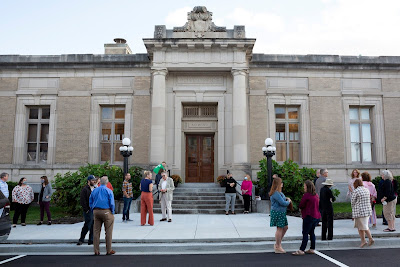 |
| Benjamin Grierson is included in this display (Jacksonville Area Museum) |
The Jacksonville Area Museum, which formally opened its
doors this past weekend, has a display that details President Abraham Lincoln’s
ties to the community and individuals from that time period.
Among them was Brig. Gen. Benjamin Grierson (left), whose Jacksonville mansion is available for tours by appointment. Grierson, a music teacher and band leader before the conflict, wrote music for Lincoln’s presidential campaign in 1860.
He joined the cavalry and in November 1862, became a
brigade commander in the Army of the Tennessee. In 1863, he led a successful raid deep in enemy territory that drew Confederate resources away from the
Federal assault on Vicksburg. He took part in other successful campaigns in the next year and a half.
Perhaps Grierson’s biggest legacy is the formation of the 10th Cavalry Regiment after the war. The Buffalo Soldiers, who later on comprised several regiments, are remembered for their courage, discipline and low desertion figures when compared to other units.
The 10th was formed in 1866 and based in Fort Leavenworth and then Fort Riley, Kan. It took part in several campaigns against Native tribes. Initially, Buffalo Soldier units were led by white officers. They often faced prejudice within the U.S. Army.
Grierson was a colonel when he commanded the troops for a few years. He exhibited his own bravery when it came to colleagues.
 |
| Buffalo Soldiers of 25th Regiment in 1890 (Library of Congress) |
A native of Pittsburgh, the soldier lived
in several states, including Illinois. He died in Michigan in 1911 and is buried in Jacksonville, a
community of about 20,000 residents west of Springfield.
The museum, which is housed in an old post office, includes a portrait of Richard Yates, Illinois’ Civil War governor and a reference to James Jaquess, a soldier and private agent for Lincoln during the war. Jaquess spoke with Confederate President Jefferson Davis about potential peace.
 |
| Opening weekend at the old post office (Jacksonville Area Museum) |
David Blanchette, board chairman of the
museum, told the Picket the English items are not currently on display, but
will be brought out on special occasions.
An intriguing item in the collection, which the Picket wrote about in March, is a rusted bayonet uncovered by a resident while using a garden tiller in May 2002. He donated it to the museum this year.
No one knows for sure how it got there, but Blanchette says it could have been left by a soldier with the 21st Illinois Infantry, which marched through the town in July 1861.
 |
| Bayonet discovered in resident's yard (Market House Antiques) |
For now, the bayonet remains on display at Market House Antiques, near the museum.
 |
| Gov. Richard Yates |
Jacksonville’s
Civil War history is only a small part of the exhibits, which cover industry,
the arts, local colleges and more.
“The public’s reception so far has been tremendous and very
supportive. This newest attraction for the city of Jacksonville should prove to
be a great educational and economic development resource,” said Blanchette.
The Jacksonville Area
Museum is open on Wednesdays, Saturdays
and Sundays from 10 a.m to 4 p.m. There is no
admission fee, although a $5 donation is suggested.

No comments:
Post a Comment